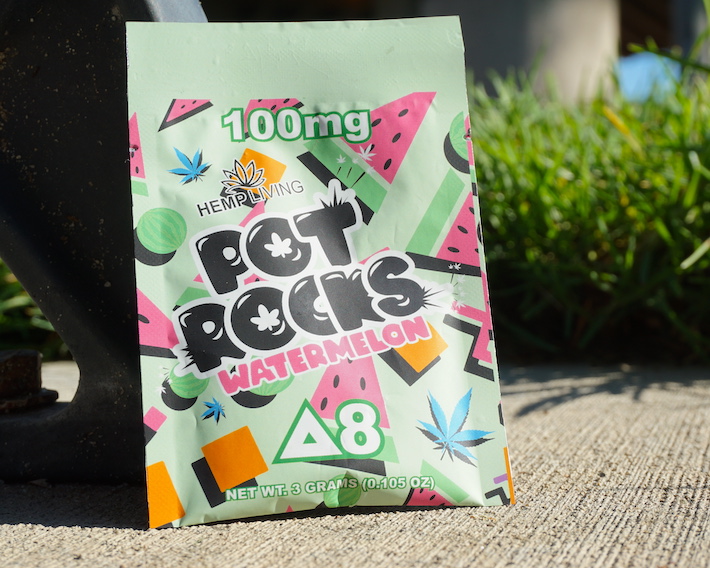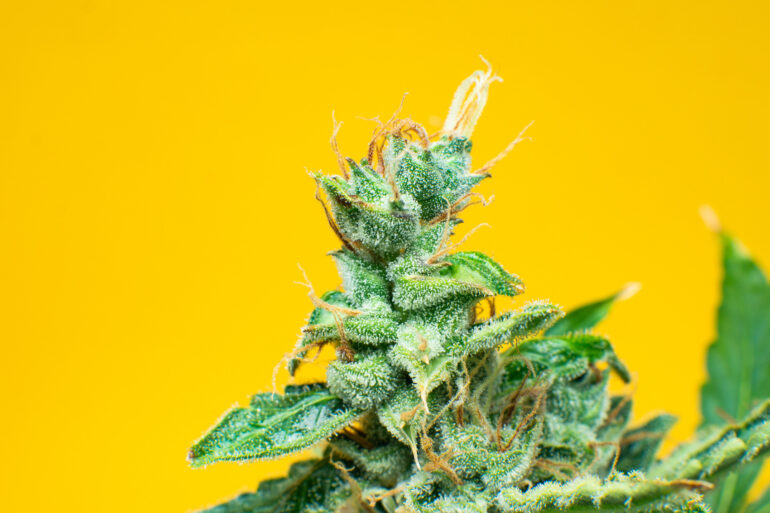Delta-8 THC is much more restricted in Kansas than it is in other states, but it is still technically legal if derived from hemp.
As in several other states, Kansas CBD and hemp stores were under the impression they were selling legal products until state Attorney General Schmidt released an opinion stating that the majority of products actually weren’t.
Despite the legal clarification the opinion provided, there is still much misunderstanding surrounding Kansas hemp law, so we’ve answered the most important questions here.
Is Delta-8 THC Legal to Sell in Kansas?
Delta-8 THC is technically legal to sell in Kansas, but only in very restricted circumstances.
Senate Bill (SB) 263 and House Bill (HB) 2167 established the hemp program in Kansas, with HB 2167 establishing the commercial market and refining definitions. Under this law, hemp is defined (section 7(b)(7)/page 6) in the same way as in the 2014 federal Farm Bill:
‘Industrial hemp’ means all parts and varieties of the plant cannabis sativa L., whether growing or not, that contain a delta-9 tetrahydrocannabinol concentration of not more than 0.3% on a dry weight basis.
With the important note that the delta-9 THC concentration actually combines delta-9 with “its optical isomers” in Kansas law (section 7(b)(2)/page 6). This means that the limit for THC also includes delta-8 THC by default. This alone makes most commercial delta-8 THC products illegal in Kansas.
The law also specifies (section 5(a)(1)/page 4) that cigarettes, cigars, teas, chew/dip/smokeless material, vaping liquids or any hemp ingredient banned by the Kansas Food, Drug and Cosmetic Act is not allowed to be manufactured, marketed or sold in the state. It also states that (section 5(b)/page 5) hemp buds or flower can only be sold to registered hemp processors in Kansas.
In short, this means that while hemp-derived delta-8 THC is technically legal in the state, the vast majority of commercial products are in fact illegal.
RELATED: Where Is Delta-8 THC Legal? A State-by-State Map
Delta-8 THC Legislation Timeline for Kansas
Delta-8 THC was legalized (broadly speaking) in Kansas in 2019, but a 2021 opinion from the Attorney General emphasized the many caveats that the law puts in place.
Kansas passed SB 263 in April 2018, which established an industrial hemp research program in the state. Then, following the passing of the 2018 federal Farm Bill, the state passed HB 2167 in May 2019, establishing a commercial hemp program in the state and establishing limitations on the types of hemp products permitted to be sold.
After some confusion, on December 2nd, 2021, Kansas State Attorney General Schmidt released a controversial opinion stating delta-8 is illegal unless it’s sourced from legal hemp and carries no more than 0.3% THC.
The term “total tetrahydrocannabinols” is interesting here. It doesn’t mean just delta-9; it means delta-9 and all its isomers, including delta-8, delta-10, delta-7 and others.
In other words, essentially all commercial delta-8 products are considered illegal in Kansas since they carry above 0.3% combined THC.
You can read an excerpt from Schmidt’s opinion below:
Delta-8 tetrahydrocannabinol (Delta-8 THC) comes within the definition of a Schedule I controlled substance and is unlawful to possess or sell in Kansas unless it is made from industrial hemp and is contained in a lawful hemp product having no more than 0.3% total tetrahydrocannabinols (THC). Unlawful hemp products include cigarettes, cigars, teas, and substances for use in vaping devices. Delta-8 THC derived from any source other than industrial hemp is a Schedule I controlled substance and unlawful to possess or sell in Kansas. Other federal and state laws and regulations place additional limits on the legality of products containing THC and other cannabinoids.
Kansas State Attorney General Schmidt
According to a February 2022 Twitter post from Johnson County District Attorney Steve Howe, written notices are now being sent to businesses stating they must remove delta-8 products from their stores by March 20, 2022.
Law enforcement did indeed raid stores in April 2022, seizing many products from multiple stores. A month later, one had re-opened with delta-8 THC back on the shelves. Sacred Leaf store owner Becky Yokiel commented to journalists that, “The Sheriff was very specific about what was allowed at this point and what wasn’t allowed. So for right now we could only do the edibles.”
Can Delta-8 THC Be Added to Food?
There is no legal basis for adding delta-8 THC to food in Kansas, but it seems to be tolerated. However, it appears to violate the Kansas Food, Drug and Cosmetic Act as well as the federal equivalent.
HB 2167 states that (Sec. 5(a)(1)(F)/page 4-5) it is unlawful to manufacture, sell or market “any other hemp product intended for human or animal consumption containing any ingredient derived from industrial hemp that is prohibited pursuant to the Kansas food, drug and cosmetic act.”
In turn, the Kansas food, drug and cosmetic act clarifies that a food is adulterated if it contains a “deleterious substance which may render it injurious to health.” This would assumedly include delta-8 THC, since it is not generally recognized as safe, as the FDA argues at the federal level.
The same paragraph of HB 2167 does add that “This subparagraph shall not otherwise prohibit the use of any such ingredient, including cannabidiol oil, in such hemp products.”
So while it appears there is a legal basis for adding CBD to food, the same can’t be said for delta-8 THC. Despite this, based on the law enforcement action referenced above (and products still available for sale) it appears that this is currently tolerated provided the product meets the state’s other requirements.
Can You Buy Delta-8 THC in Kansas?

Despite all of the confusion surrounding state law, in practice there are stores still selling delta-8 THC products in Kansas, including products such as pre-rolls and vapes which are explicitly illegal to sell in the state.
Delta-8 Alternatives You Can Legally Buy in Kansas
Most delta-8 THC alternatives are subject to the same limitations as delta-8 THC in Kansas. However, HHC is not a THC, and as such its concentration in final products is not limited by law provided it was derived from compliant hemp. So HHC is likely the best option for a legal alternative in Kansas.
In line with this conclusion, when stores were raided in April 2022, HHC remained on the shelves.
RELATED: The Best HHC Edibles, Reviewed
Age Restrictions
There are no age restrictions on delta-8 THC products sold in Kansas. While stores tend to institute a minimum age of 21 for sale, this is not established by Kansas law at present.
Public Consumption
There is no law addressing public consumption of delta-8 THC in Kansas, but some issues make it difficult to consume in public legally.
Firstly, you cannot smoke delta-8 THC products anywhere smoking is banned. Secondly, and more importantly, if the product contains more than 0.3% of any THC, it isn’t legal hemp and could land you in trouble with the law.
Since consuming delta-8 THC can easily be confused for consuming marijuana, and many commercial products actually break Kansas law, public consumption may lead to a discussion that could land you in more serious trouble.
Kansas DUI Law
Driving under the influence of any drug to a degree you’re incapable of driving safely is illegal in Kansas.
Kansas DUI law states that it is illegal to drive while under the influence of “any drug or combination of drugs to a degree that renders the person incapable of safely driving a vehicle.” This unambiguously includes delta-8 THC, so it is not legal to drive if you’re high from delta-8.
Punishment in the first instance includes between 48 hours and 6 months imprisonment (possibly replaced with 100 hours’ public service) and a fine of between $750 and $1,000.
Traveling to Kansas With Delta-8 Products
Provided that the delta-8 THC product is legal in Kansas, you can travel to the state with delta-8. However, most products are not legal in Kansas so this is likely not wise.
Since Kansas considers anything with over 0.3% of any THC to be marijuana – not hemp – you should be very careful about bringing delta-8 THC into the state. Even if it’s legal at the federal level, the state considers most commercial delta-8 THC products to be illegal, which may cause you problems when traveling to the state.
If you do bring a delta-8 THC product, you should bring a Certificate of Analysis (COA) showing that it contains less than 0.3% THC.
Closing Thoughts: The Future for Delta-8 THC in Kansas
While bills were proposed in 2023 session relating to hemp, these didn’t pass and things will remain as they stand until the 2024 session starts in January. A couple of bills that were proposed would have loosened restrictions, but neither made it through into law.
HB 2168 would have loosened the restrictions around using hemp ingredients in animal feed, while keeping the restrictions on food for human consumption. SB 276 was a little more ambitious, essentially adding the “including the seeds thereof and all derivatives, extracts, cannabinoids, isomers, acids, salts and salts of isomers” part into the definition of hemp (to match the 2018 Farm Bill) and changing the THC threshold for hemp and hemp products so it only applied to delta-9 THC. This would basically have removed the restrictions on delta-8 in Kansas.
The fact that neither bill progressed very far is a sign that the legislature is not particularly interested in loosening restrictions on delta-8 THC. However, with many crucial rules missing – age limitations, for a start – it’s likely there will be some action on delta-8 THC coming in 2024.
